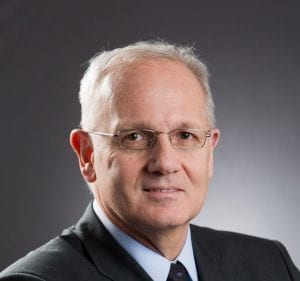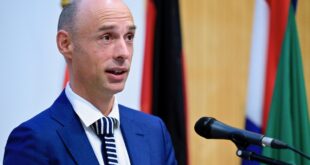
In the presence of Abdellatif Loudiyi, Minister Delegate to the Head of Government in charge of the National Defense Administration of Morocco, and Mr. Moulay Hafid Elalamy, Moroccan Minister of Industry, Investment, Trade and Digital Economy, Jean-Yves Le Gall, President of the Centre national d’études spatiales (CNES) and of the International Astronautical Federation (IAF), gave the opening address on 24 April 2019 in Marrakesh at the GLEC 2019 Global Conference on Space for Emerging Countries (GLEC).
Co-organized by IAF and Morocco’s Royal Centre for Remote Sensing (CRTS) with support from CNES, GLEC 2019 is the first international space conference of its kind dedicated to emerging countries, bringing together more than 300 specialists for three days in Marrakesh.
At the opening session, Jean-Yves Le Gall recalled IAF’s history, from its inception in 1951 to its current success built on the motto Connecting @ll Space People and the keystone of its 2016-2019 agenda: ‘Promoting the principles of 3G Diversity’, 3G standing for geography, generation and gender. He then set out the five goals for the three-day GLEC 2019 programme to actively engage emerging countries in the international space scene: 1. Highlight the socio-economic benefits of space applications. 2. Understand the various financial models for the optimal resourcing of national space programmes. 3. Identify opportunities for technology spin-off and skills transfer. 4. Create awareness about the basic infrastructure requirements for operationalizing national space programmes. 5. Create awareness of the essential legislative and policy elements that must be considered in establishing the foundation for national space programmes.
CNES’s President then took part in the round table on ‘The Benefits of Space Technology and Applications to Socio-Economic Development’. He underlined how lowering the cost of getting into space has opened up the closed circle of spacefaring nations of recent decades, thus bringing the benefits of space to a wider audience. Today, satellite data are integral to public policies and investments in this sector are directly benefiting citizens. Space applications are seen as a powerful tool to drive socio-economic development and much more than just an instrument of political prestige. “By sharing our expertise with all these new international partners, we are building our own knowledge in return. This win-win approach that I initiated a few years ago is bearing fruit,” he noted.
On the sidelines of GLEC 2019, Jean-Yves Le Gall met Zakaria Moudden, Director of Morocco’s Royal Centre for Space Studies and Research (CRERS), and CRTS Director Driss Ei Hadani, to whom he renewed his invitation to attend the signing ceremony of the Joint Declaration of Interest on the Space Climate Observatory (SCO) planned this summer during the G7 summit. They also discussed progress on the initiative to set up an ESA Business Incubation Centre (BIC) for Africa, with the aim of promoting uptake of space technologies by African businesses.
 SpaceWatch.Global An independent perspective on space
SpaceWatch.Global An independent perspective on space




